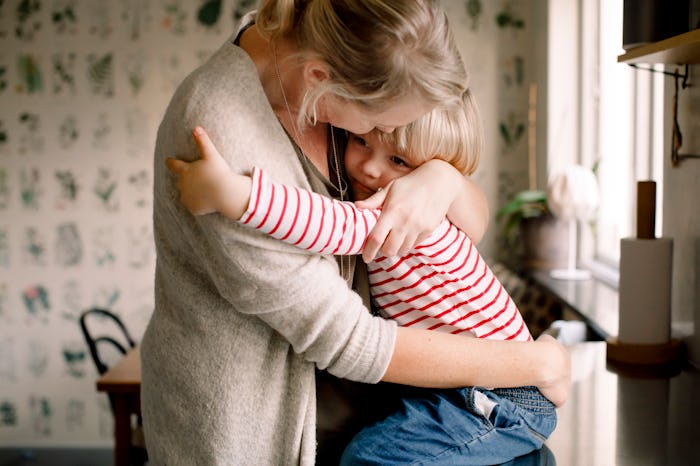Finally using the toilet is such a huge childhood milestone, that your kiddo having accidents post-potty training can make you feel like a giant failure. As disheartening as it is, plenty of parents (myself included) have been there. The reasons for potty training regression vary, but experts agree it can actually be just another part of a typical childhood experience.
"Regression can be very normal and developmentally appropriate," pediatrician Dr. Natasha Burgert tells Romper. "Changes or stress cause every one of us to regress in skills, even as adults."
If you have ever battled a half-naked toddler who suddenly balks at sitting on their big kid toilet and demands diapers over their impossibly cute Paw Patrol undies, you know exactly how frustrating potty training regression can be. When your little one goes from successfully relieving themselves in the toilet to you needing to keep an entire change of clothing on hand at all times, it can feel like you'll never get them back in the bathroom.
You'll get through this trying time, but it's important to understand why your child's potty training regression is happening so that you can get a better handle on the best way to forge ahead.
1Constipation
"Constipation is a common reason for potty training regression," pediatrician Dr. Whitney Casares tells Romper. "Constipation can cause hard stools, which are difficult to pass and can be uncomfortable. If a child experiences pain while pooping on the potty, he may be hesitant to try it again."
Your child being constipated might not just impact their ability to expel their bowels, but might cause them to hesitate when urinating as well. It's important to address any constipation issues with your pediatrician, which can help remedy their regression.
"Especially in the early months of toilet training, the signal that controls pee and poop can get confused," Burgert explains. "Once one system is not working properly, you will see regression in both."
2Stress
Whether it stems from starting school, moving homes, parents divorcing, traveling, the birth of a sibling, or even something as unexpected as a worldwide pandemic, experts agree that stress can cause potty training regression.
"Young children have difficulty identifying and communicating their emotions, especially difficult emotions like fear, loss, sadness, and jealousy," Dr. Laura Gray, clinical psychologist at Children’s National Hospital tells Romper.
Stress can also cause kids to show signs of regression in other areas like sleeping alone or handling being separated from their parents, Gray explains. "Young children may experience regressions as an unintentional way of seeking more attention, comfort, and support during a time of transition," she says. "Other children develop a sense of shame around accidents and increased stress about potty performance, making it more difficult to maintain potty skills."
To help kids cope, it's important to talk with them about any stressors and help them identify their emotions. Taking a break from potty training during a stressful time and coming back to it when things settle down is also a potential solution.
3Routine Changes
"Big events like the birth of a younger sibling or even a move to a new house can trigger potty training regression," Casares tells Romper. These events not only come with stress, but routine changes that can lead to training problems.
"For these kids, the regression is temporary and can be managed with behavioral management tweaks," Burgert explains. "Regression should be managed without punishment and expected at times of transition. Most kids can get back on track quickly with a modified version of the technique used to acquire the skill in the first place. Consider scheduled sitting, a potty watch, controlling constipation, sticker charts — all these things can work!"
4Urological Problems
In addition to constipation, certain urological problems can cause potty training regression. "Common physical causes of potty training regression include constipation and urinary tract infections," Dr. Stephanie Hemm with LifeBridge Health Pediatrics at Loch Raven tells Romper. "It’s always a good idea to check with your child’s doctor if you are concerned."
When going down the checklist of things that could be contributing to your child's regression, Gray explains that urological issues should definitely be on the list. "If your child is not on the young side and you’ve not had any recent stressors, then talk to your child’s pediatrician to rule out any possible medical explanations," she says.
5They're Just Not Ready
Although this reason may not fit the classic definition of regression, parents may see a child who isn't really developmentally ready to be potty trained back off from the skill.
"Sometimes, when there is too much structure around the potty learning, and too much pressure on a child not yet developmentally ready, it means the child does not end up trained, but rather the parents do," Hemm says. "The parents are the ones trained to anticipate the toilet need." She says that when it seems like your child is staying dry longer, what's really happening is that you are better able to anticipate when your child needs to go. Once you ease off this structure, you may find yourself disappointed that your child can't maintain the dry streak without you. It just means your child's not ready right now, but will be in a few months.
Another regression issue related to readiness that Hemm says she sees often is strong-willed children who will balk at potty training if it isn't their idea, but instead their parent's insistence. "This is normal, healthy individuation that, if successfully navigated, will help develop a strong, independent person. Parents just have to make it to big girl underpants first," she explains.
Experts:
Natasha Burgert, MD, FAAP, pediatrician in South Overland Park, KS
Whitney Casares, M.D., M.P.H., F.A.A.P. is the author of The New Baby Blueprint: Caring for You and Your Little One
Dr. Laura Gray, clinical psychologist at Children’s National Hospital
Dr. Stephanie Hemm, LifeBridge Health Pediatrics at Loch Raven
